Sam Altman and Dustin Moskovitz: How and why to create a startup?

Stanford course CS183B: How to start a startup . Started in 2012 under the leadership of Peter Thiel. In the fall of 2014, a new series of lectures by leading entrepreneurs and Y Combinator experts took place:
Second part of the course
First part of the course
- Sam Altman and Dustin Moskovitz: How and why to create a startup?
- Sam Altman: How to form a start-up team and culture?
- Paul Graham: Illogical startup ;
- Adora Cheung: Product and Honesty Curve ;
- Adora Cheung: The rapid growth of a startup ;
- Peter Thiel: Competition - the lot of losers ;
- Peter Thiel: How to build a monopoly?
- Alex Schulz: An introduction to growth hacking [ 1 , 2 , 3 ];
- Kevin Hale: Subtleties in working with user experience [ 1 , 2 ];
- Stanley Tang and Walker Williams: Start small ;
- Justin Kahn: How to work with specialized media?
- Andressen, Conway and Conrad: What an investor needs ;
- Andressen, Conway and Conrad: Seed investment ;
- Andressen, Conway and Conrad: How to work with an investor ;
- Brian Cesky and Alfred Lin: What is the secret of company culture?
- Ben Silberman and the Collison Brothers: Nontrivial aspects of teamwork [ 1 , 2 ];
- Aaron Levy: Developing B2B Products ;
- Reed Hoffman: On Leadership and Managers ;
- Reed Hoffman: On the leaders and their qualities ;
- Keith Rabois: Project Management ;
- Keith Rabua: Startup Development ;
- Ben Horowitz: Dismissal, promotion and reassignment ;
- Ben Horowitz: Career advice, westing and options ;
- Emmett Shire: How to conduct interviews with users;
- Emmett Shire: How to talk to users in Twitch ;
- Hossein Rahman: How hardware products are designed in Jawbone;
- Hossein Rahman: The Design Process at Jawbone.
In the first lecture: Sam Altman (President Y Combinator, topic: “Idea, product, team, implementation - part I”), Dustin Moskovitz (co-founder of Facebook, Asana, Good Ventures, topic: “Why create a startup?”)
')
Disclaimer: caution, traffic (bulk material + lecture slides).
Sam Altman: Idea, Product, Team, Implementation - Part I
Greetings to all students of the CS183B course. My name is Sam Altman. Today, I lead Y Combinator (YC) [Y Combinator (YC) is an acceleration program for start-ups that are at the seed stage of development (seed-stage) - hereinafter approx. trans.]. Nine years ago, I studied at Stanford, but at some point I decided to start a company and expelled [in 2005, Sam founded Loopt , which was acquired by Green Dot Corporation in 2012]. The last few years I have been investing. At YC, we have been teaching people to work in start-ups and have been doing this for 9 years now. The main part of the material that we give has a corresponding specificity, but about 30% of this information can be applied, working with almost any business. It is on this area of knowledge that we decided to concentrate on this course. I am sure that the data of 30% will help you in your business [In the third lecture of the course Paul Graham once again underlines the fact that most of the problems faced by startups are common to all projects, regardless of the specific area of their operation. It is these universal questions that are discussed in this course].
We have taught a lot of students of our course in YC, but a significant part of this knowledge was not in any way recorded. As part of this course, we solved this problem by providing publicly available course materials. We invited the most famous experts, asking them to share what has already been announced in for YC projects. To date, we have invested in 725 companies [including Dropbox, Twitch, Reddit and RapGenius, with a total capitalization of more than $ 30 billion] and are confident in the practical significance of the knowledge that we share with you. Of course, our investment capacities are limited, but we are ready to share knowledge completely freely.

I will appear before you as a lecturer three times [apart from this lecture, Sam has already held its second part and must complete the course with his speech]. Including YC experts, all the speakers of this course [ Paul Graham , Mark Andressen , Ben Horowitz , etc.] have already managed to participate in the creation of companies for a billion dollars or more. Based on this, we can talk about the practical nature of the advice that you get from the people who created their business.
The materials of this course are aimed at those who launch a startup focused on rapid growth and final transformation into a large company [ Steve Blank defined a startup as a temporary organization aimed at finding a repeatable and scalable business model]. I would like to warn you that many tips may not be entirely suitable for use in cases where it is not about a startup, but just a big business is being considered. One way or another, I think that we will be able to interest you. I am sure that the future is behind startups, although they are different from ordinary companies, and an understanding of the principles of their work is really worth it. In this and subsequent lectures, I will try to give an overview of the 4 main elements on which you should concentrate to maximize the results of your project [idea, product, team and implementation]. As part of further lectures, these elements will be reviewed by our experts in a more in-depth format.
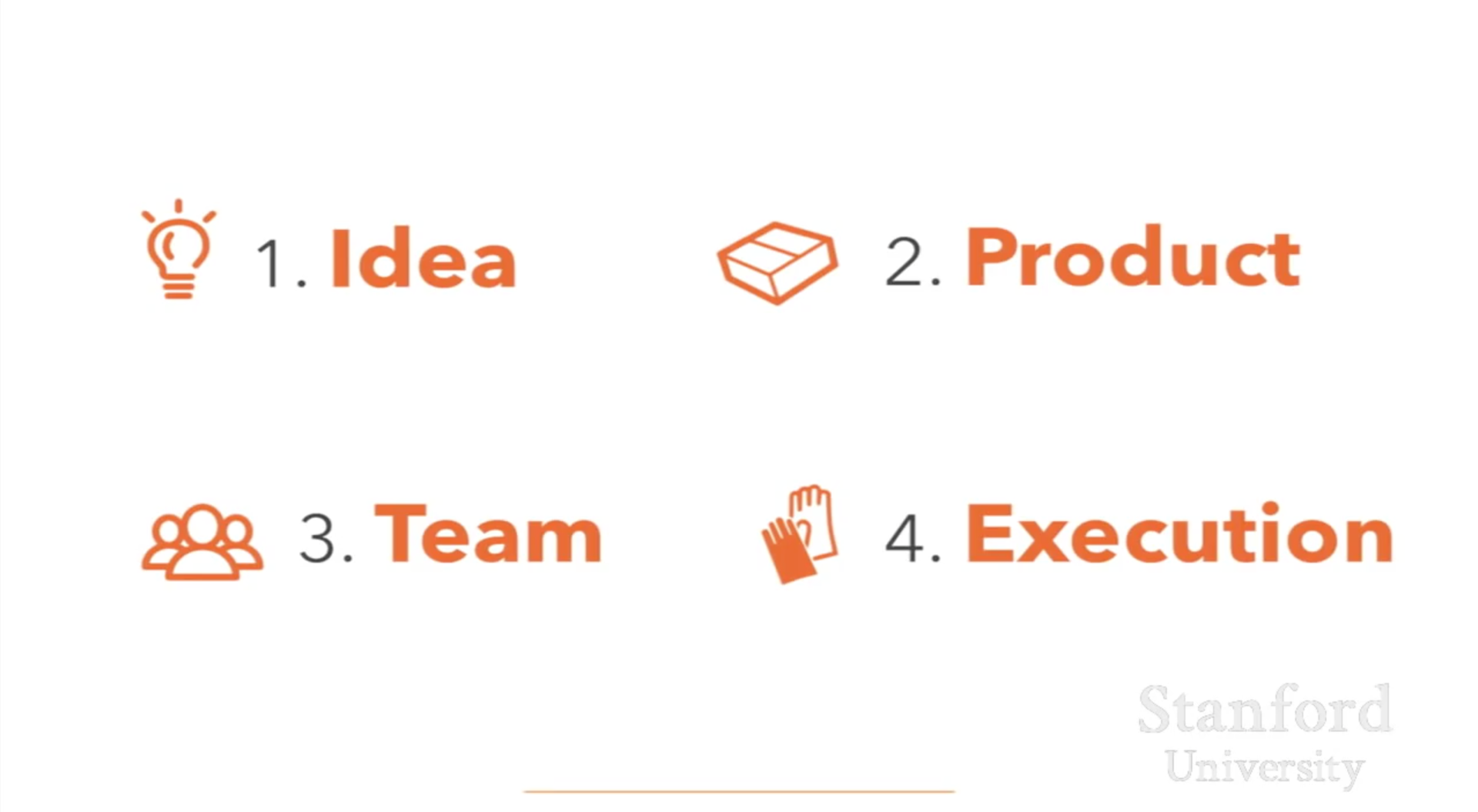
So, 4 key elements that you need: a great idea, a great product, a great team and a great implementation. Of course, all these elements overlap, but I will tell you separately about each one in order for us to sort it all out.
In any case, there is the likelihood of your failure. The final result formula looks like this:
Idea x Product x Team x Realization x Luck,
where luck is a random number from zero to ten thousand. Like that. And if you succeed in 4 areas that you can control, then you can count on a modest success.
Ben Horowitz comments:
This is a good approach to the consideration of this issue, because you have no guarantees of success regardless of the quality of the implementation of your idea. Thus, we can say that luck for the most part comes unexpectedly from an area that you do not control.
For example, Palm created an excellent OS and a good smartphone. When they started, their competitors were Nokia and Blackberry. Both of these companies have lost the winning direction of development of their products, and it would seem, Palm had to "shoot."
Unfortunately, with this company something happened that practically does not occur in the technology market: two IT giants (Apple and Google) set their sights on a similar market niche, presented great products and pushed Palm to 3rd place. If neither Apple, nor Google turned their attention to this niche or decided to sell their products, then Palm history would be another success story. Yeah.
So, it was a failure that befell Palm. Sometimes such situations can be calculated, but for Palm it was a really big failure.
It is surprising that in the world of startups the conditions of the game are equal for all. Both for experienced veterans, and for young beginners. Everyone can get their way. In a world of start-ups, circumstances that are negative for any other business, such as, for example, lack of funds and fame, are only good for you. That's what I like about startups.
Before you dive into the analysis of solutions, I would like to discuss the reasons why you are going to launch your own startup. I myself, to some extent, doubt the necessity of this course, for you should never launch a startup for the sake of the process itself. There are much simpler ways to get rich, and any, absolutely any startup founder will tell you that he couldn’t have thought about all the difficulties of this path [Ben Horowitz wrote a good book on this subject ( excerpt in English)]. You should work on your own startup only if you are not bothered by any problem, and you see no other way to solve it except launching your own company [Sam's remark is one of the key points of the first lecture. A similar assessment a few years ago led Paul Graham, who conducted his seminar in the framework of this course. A much deeper understanding of the need for an irresistible desire to deal with any problem can be found in the lecture by Bret Victor].
The desire should be in the first place, and its concrete embodiment in the form of a startup - in the second. All classes at YC follow this principle, and in the second part of this lecture I will pass the floor to Dustin Moskowitz, who will tell more about this. We were so overwhelmed by the general attention to this course that we decided to dwell separately on the reasons that people decide to launch their own startup.

The first element of the 4 is the idea. In recent years, a well-known saying has been formed: “A good idea in itself does not mean anything”. Yes, and many hours of thinking about your idea no longer seem to be some exciting activity. You are expected to start working decisively, actively using the trial and error method without any time spending on understanding the value and efficiency of your idea. The more fundamental changes (pivot) of your business model you make, the better.
There is some truth in this approach. Predict the development of projects entirely impossible. Especially when your product is still not in the hands of your customers. Implementing a specific product is 10 times more important and 100 times more difficult than picking a good idea.
Today, many are going to extremes, while a bad idea remains a bad one, and everyone around is just waiting for your next change in business model. Excellent implementation of a bad idea will not lead you anywhere. There are exceptions, but most successful companies started with a good idea, and not with changing their business model (pivot).
If you look at the stories of successful pivot, you will be able to notice the fact that they almost always address the problems of the founders themselves, and not randomly invented ideas. For Airbnb, for example, Brian Chesky’s inability to pay for housing at the time he had a couple of rooms was free. In general, fundamental changes in business models do not lead to the formation of large companies. I myself was convinced that ideas cost nothing, but I am sure that today this is absolutely not the case.
Dave McClure comments:
A good approach to the formation of ideas for your project is a solution to the problem, or rather the desire to solve your own problem (the existence of which is confirmed by a significant number of other people). When people are interested in my opinion on their ideas, I always turn the situation around 180 degrees, asking them what their customers think (do they use the product, do they pay for it?). Usually, the people who ask me a similar question are either poorly informed about their customers and their problems, or they are not working enough to understand how customers use their product and what they are willing to pay for.
Successful entrepreneurs are not interested in my opinion about their product or idea. They simply demonstrate the results and indicators that speak about the profitability of their project and the successful use of their products by customers.
The definition of the very concept of an idea, if we are talking about it, is rather vague. It includes the size and growth rate of the market, the company's growth strategy, the defensive strategy, etc. When evaluating ideas, you need to think about all this, and not just about the product. If everything goes well, then you will work on this project for a good 10 years, so that preliminary reflections on the value proposition of your business will not interfere. Of course, the plans themselves are worthless, meaning the planning process, which is often absent in modern start-ups.
Long-term planning is quite rare, but in start-ups its lack is felt stronger than anywhere else. By incorporating it into your work, you will get a significant advantage. Remember that your idea will evolve and become more ambitious over time. Of course, there is no need to think through every step on the way to seizing the world, but in any case, you need to make a start from something. You need to formulate the core of your idea, which you will be able to develop in the future.
When working with founders of startups, we often encounter false beliefs about the need to create a business that is very hard to copy [if there are no absolutely new ideas, then there should be at least an understanding of the competitive advantages of your project]. This is very important to understand at the stage of forming an idea.
I would like to once again return to the fact that in the first place there is always an idea, on the second - a startup. Wait for the moment when you are ready to devote all your attention to the work on a certain idea, then start your own company. This approach can also be used to select ideas for subsequent implementation. If you have several ideas at once, work on the one that occupies your mind most of the time [including non-working]. We very often hear the stories of the founders, who regretted that they didn’t take the ideas that they really liked.
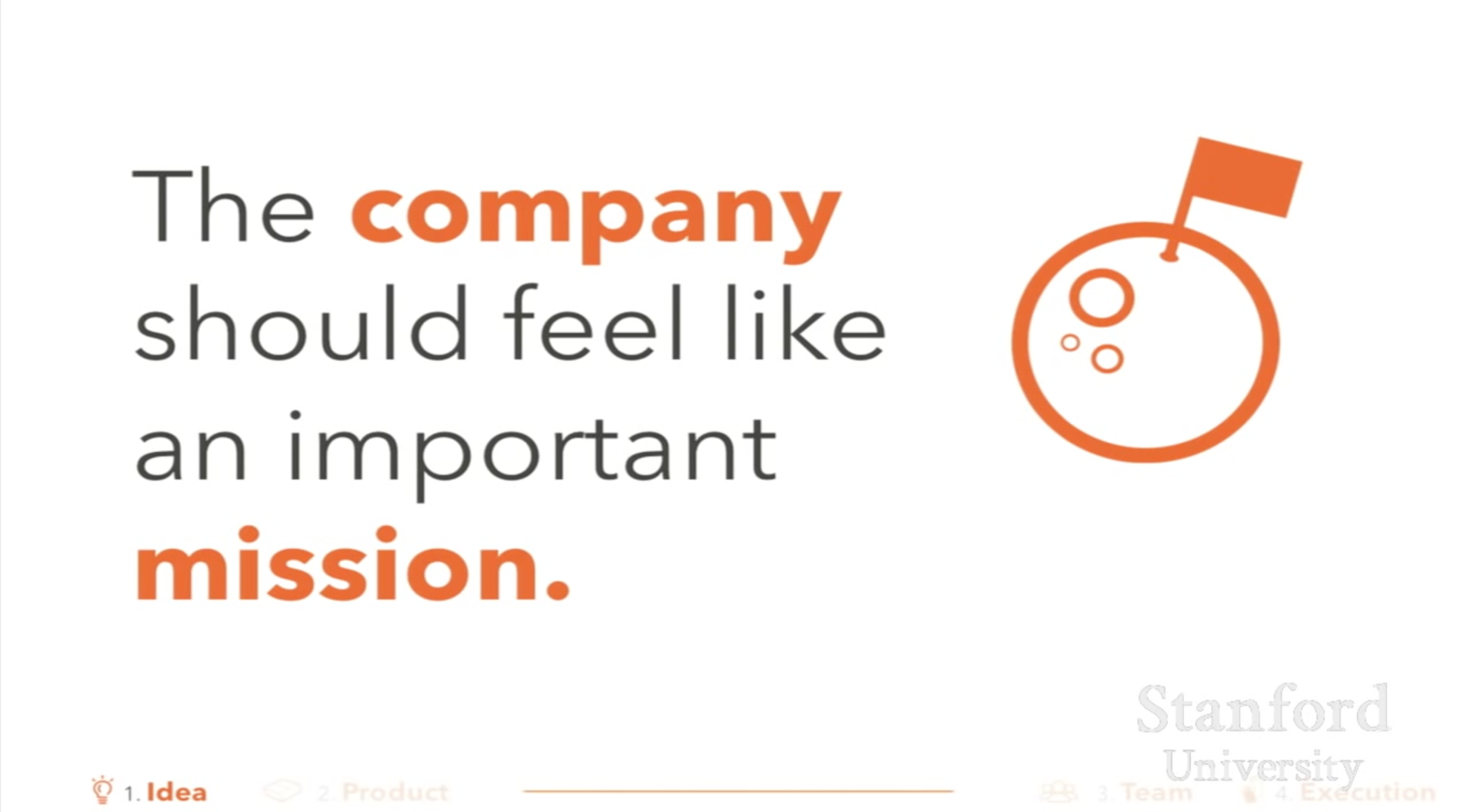
If you look at this question from the other side, it is worth saying that successful companies always focus on their mission. The effective operation of large companies requires a rather substantial concentration of efforts on a certain front of work, and the presence of an important mission helps them to achieve the necessary concentration. And the mission itself requires having a good idea at its base, which together allows us to talk about the commitment of the founders of the company.
Building a company takes many years (usually about 10 years), and if you do not like your business or do not believe in its success, then there is a chance of losing interest in this activity at a certain stage of work. I do not know of any other ways of confronting all the difficulties that await you on the path of creating your own business, except for the belief in the importance of your business [belief in the importance of your mission]. Many people think that the work on a startup will take only 2-3 years, and then you can do something really interesting, but this approach usually does not work. The creation of successful projects takes about 10 years.
Dave McClure comments:
I would even say that it is 5-10 years, but it will not be possible to confirm a sufficient degree of product quality in less than 6-12 months. And an understanding of whether the company itself is good enough comes no earlier than 1-3 years of work.
The success of companies does not occur out of the blue after 10 years of quiet life somewhere in the bushes. Usually it can be predicted much earlier.
Sam is right that the realization of a good idea can take many years, and the growth of the organization itself is even greater.
Another advantage of companies whose work is built around a specific mission is that having such a mission will help attract external support. It is much easier to get support by working on a complex and very important project, and not just on something derivative. Starting a startup, it is very difficult to build on superficial ideas, it is much easier to base something fundamental. This seems illogical to many, but it is rather difficult to exaggerate the importance of the mission of your project. I would like to emphasize it once again: derivative projects that copy existing businesses without any innovations introduced from their side are not very interesting for people from an emotional point of view and are not able to move the project team to full commitment.
Dave McClure comments:
I can not agree with that. I think that really good ideas look too radical, but certainly not terrible. Maybe just not very perfect or obvious.
Most likely they are just initial attempts to reach out to an unusual segment of the audience and solve their problem. For example, make a mouse for iPad. In this case, just the need is not too obvious.
I would say that good ideas are usually just not always perfectly implemented in the first versions of the product, but somehow solve the main problem of the client.
In the early stages of product development, this is usually sufficient, and here the race begins for the consumer to adopt this product, taking into account the need to retain the ability to compete on price, quality, or other distinctive features.
At the next lesson, Paul Graham will talk in more detail about different approaches to the formulation of ideas. For many, this is quite difficult, but I am sure that the secret of success lies in practice, which we need to devote time to.

When formulating ideas, we often encounter the fact that the best of them are rather ridiculous at the stage of their inception. The thirteenth search engine without the functionality of the web portal [of course, we can say that Sam denies his own logic, and this is a derivative idea]? Most critics have not seen any meaning in this idea. The search was already implemented, but at that time the portals were in a completely different weight category. The tenth social network for college students only? Similarly, a completely empty thought. MySpace had an absolute monopoly, and no one in the students saw their potential clients. Well, or the idea of the possibility of spending the night on the couch with complete strangers. This does not see anything good at all.
All these ideas looked awful, but in the end they formed the basis for success stories. If they initially seemed attractive, too many people would try to take advantage of them. At the fifth lesson, Peter Thiel will talk about how to transform a good idea into a monopoly. Of course, this is impossible to achieve immediately, as soon as you start work. You need to find a small market niche, win a leading position in it and only then proceed to expanding the boundaries of your audience. Based on this logic, one can understand why successful ideas look weak at the moment of their inception.
“Today only this small group of clients will use my product, but I intend to attract them all in the future. Practically all of them will become users of my product ”- this statement from your side at this stage of the formation of an idea speaks of moving in the right direction.
You will often come across the following expression: “You will need confidence in your convictions and the ability to ignore someone’s criticism.” The bottom line is that this statement balances on the verge of rationality, for the majority of people around you will criticize your ideas [especially good ideas according to Sam's logic]. You should only rejoice at this. These people will not compete with you.
Thus, do not be afraid to tell someone about your idea. In fact, good ideas will not seem sufficiently valuable to anyone. The ideal case is when you can recognize the external clumsiness of your idea, and at the same time show your approach to understanding its potential. You will look like a madman, but it will be “wise” madness. You need to take up the idea, on the implementation of which a limited number of people work, and there will be nothing terrible in its initial clumsiness.
One of the most common misconceptions is the desire to formulate such an idea or to develop such a product, which will be sufficiently large-scale in its first incarnation. This is not a good approach to business. First of all, your project should become a leader within a small market niche and only then proceed to expanding its influence. That is how most successful companies began their work. It is about developing on the basis of a precise understanding, and not about the pursuit of popularity.
Your idea should not be very attractive at first glance, but good enough in its essence. In addition, you should consider the various options for the development and the market itself. It is better to focus your attention on those market niches that should demonstrate substantial growth in the next decade. Most investors today are too meticulous in assessing the size of the market and completely forget about predicting its development.
In fact, this is one of the investors' system errors. They think about the growth of startups, but forget to take into account the growth of the market of these startups. For example, I’m much more concerned about the growth rate of a certain market niche and forecasting its ceiling, rather than its current size. This is what you should think about. I prefer to invest in companies that work with a small but very fast-growing market. And I am less interested in those companies that are trying to cover the entire market at once, whose growth rates are much slower.
A significant advantage of working with a small market niche is a high demand for existing solutions to current problems of customers. They are ready to use an absolutely imperfect product, knowing about its constant improvements. In this situation, students have an advantage in an intuitive understanding of which market niches show rapid growth in the very near future. At the same time, it is necessary to understand the impossibility of creating those market niches that have not yet been formed. In working with your project, you can change a lot, almost everything except the market. Thus, you will need to ensure the availability and projected growth of the market niche with which you plan to work.
Such an approach can be described in various ways: following someone else’s movement, “taking the elevator” or belonging to a community. All this suggests that you are aiming at a market whose rapid growth is just around the corner. Today, he may look modest, but, unlike others, you know that he will develop very quickly.
Think about where such situations can occur. To achieve success you need the flair of a fair wind.
The good news is that today the fair wind is found in more than enough volume. Mark Andressen, for example, says that software is devouring the world. It is everywhere, and a huge number of good ideas work in this area. You just need to make your choice, find the idea that you like.

Sequoia's famous question “why now?” Will help to find an explanation for the need to work with certain ideas or the need to create specific companies in your chosen period of time. The answer lies in understanding why it was impossible to do all this, for example, a couple of years ago or vice versa - a couple of years from now. Most of the successful companies with which we had the opportunity to work, repelled from really good ideas, and they had excellent answers to this question. If you still can not find any explanation, then it is worth at least periodically trying to do it.
In general, the best situation is always to try to solve your own problem within a startup. In this case, you will initially have a fairly good understanding of the essence of this problem, and the quality of your prototype will be much higher than if you had to be guided by the opinion of the client. The second case - when you solve someone's problem [and not just your own] - will require an awareness of the loss of advantage in understanding all the subtleties and the need for a detailed study of the opinions of your customers. To do this, you can even immerse yourself in their work environment, if there is such an opportunity, or simply try to get as much information from them as possible by talking several times throughout the day.
Another not entirely logical aspect of good ideas [which may not be obvious at first glance] is that you should always be able to explain them as easily as possible to others. If you need more than one sentence to explain what you are doing, this is a sign of the complicated nature of your business. . . , . -, , ( , , , , - ), .
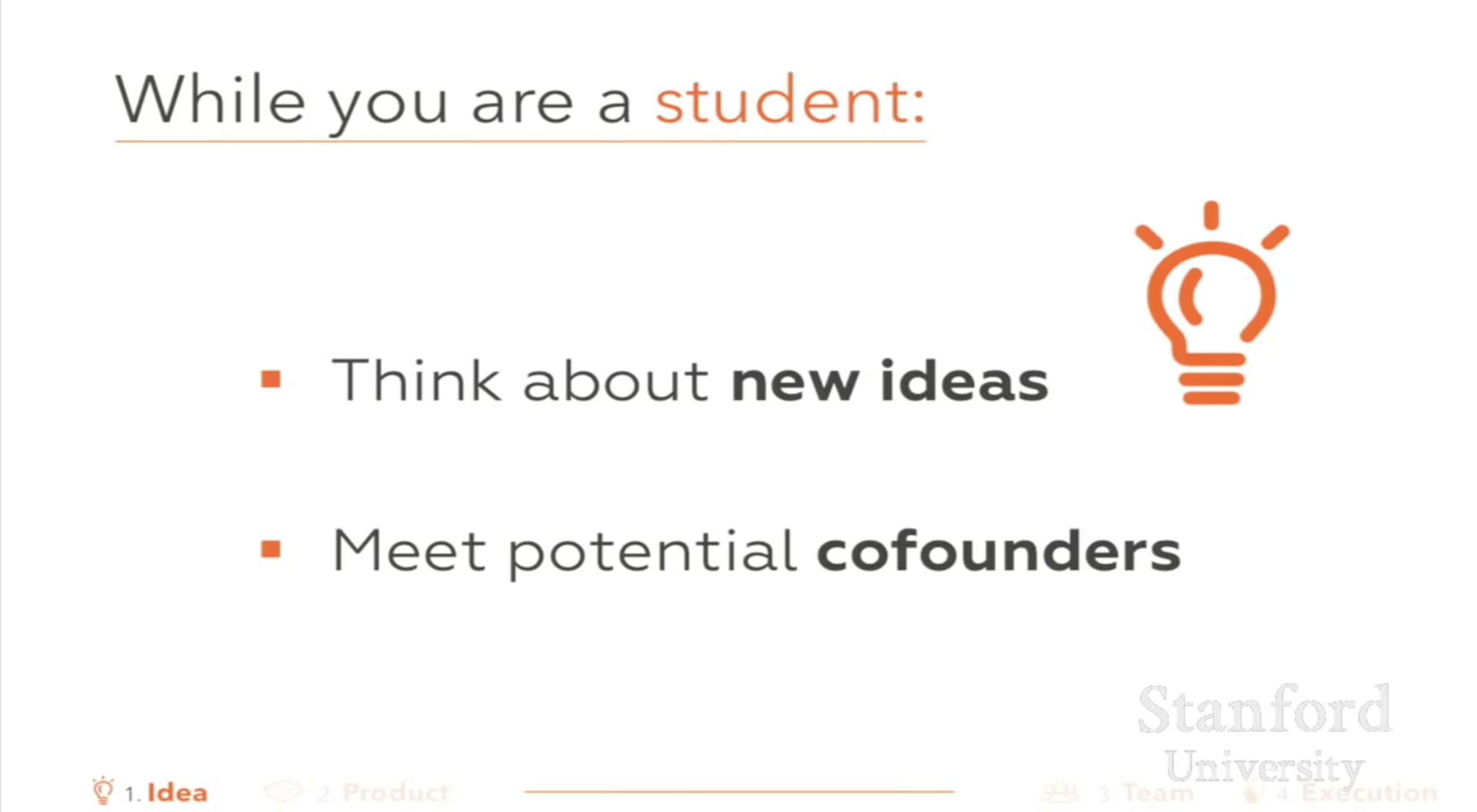
, , , – . , .
[-]. , , . , - .
50 Cent, Vitamin Water. . , , , – , . YC . - YC, , .

, , .
.
. , .
– 50 Cent
, , [ ] . , [ ], , .

, , . , , . , , , .

. , - . – . , , , - . , , , .., , . , . YC , , , [ ]. : PR, , , – , , .
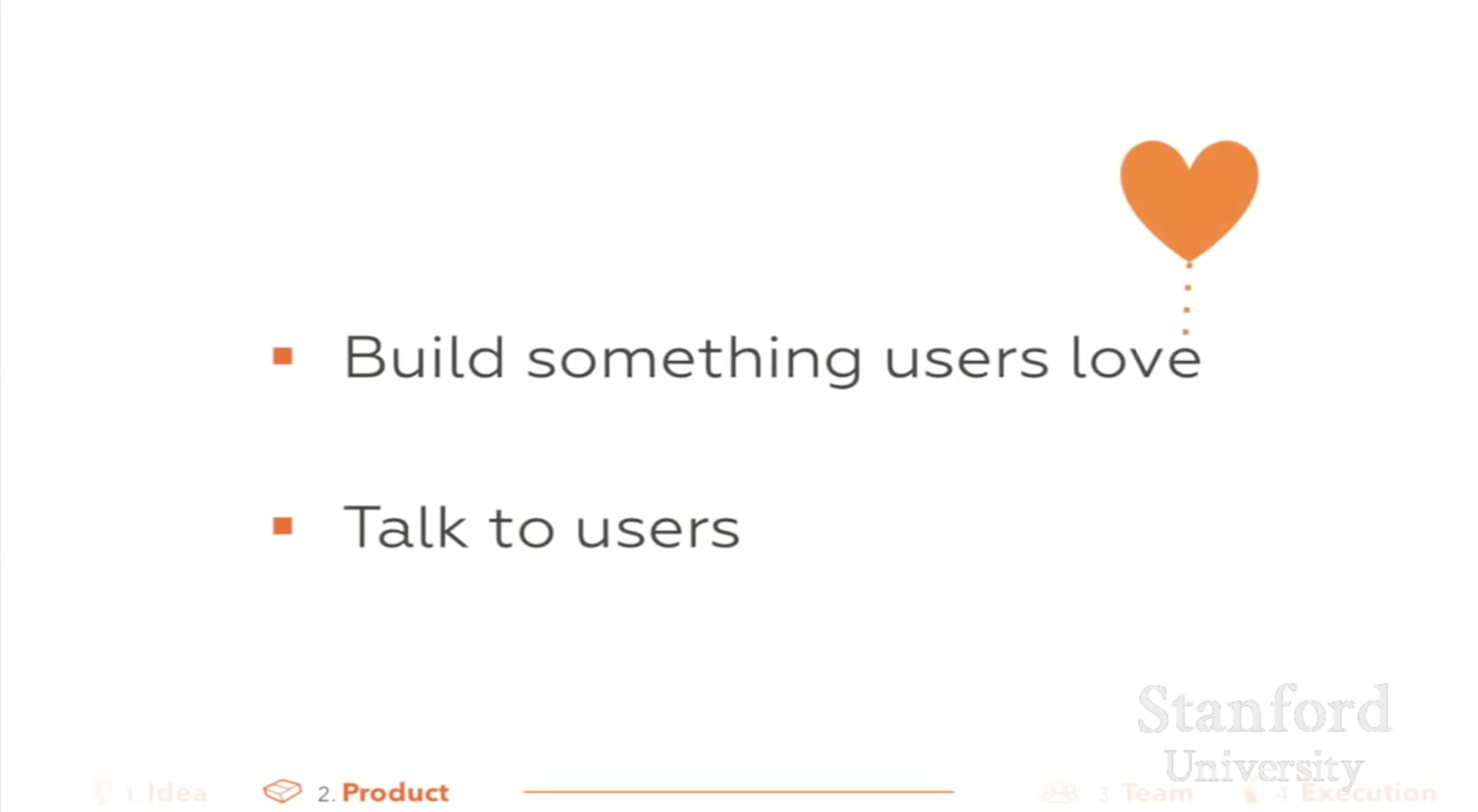
– , . . , - . «» [ ] , .
YC , – [ ], , «» . , , . , , . , , – . , .
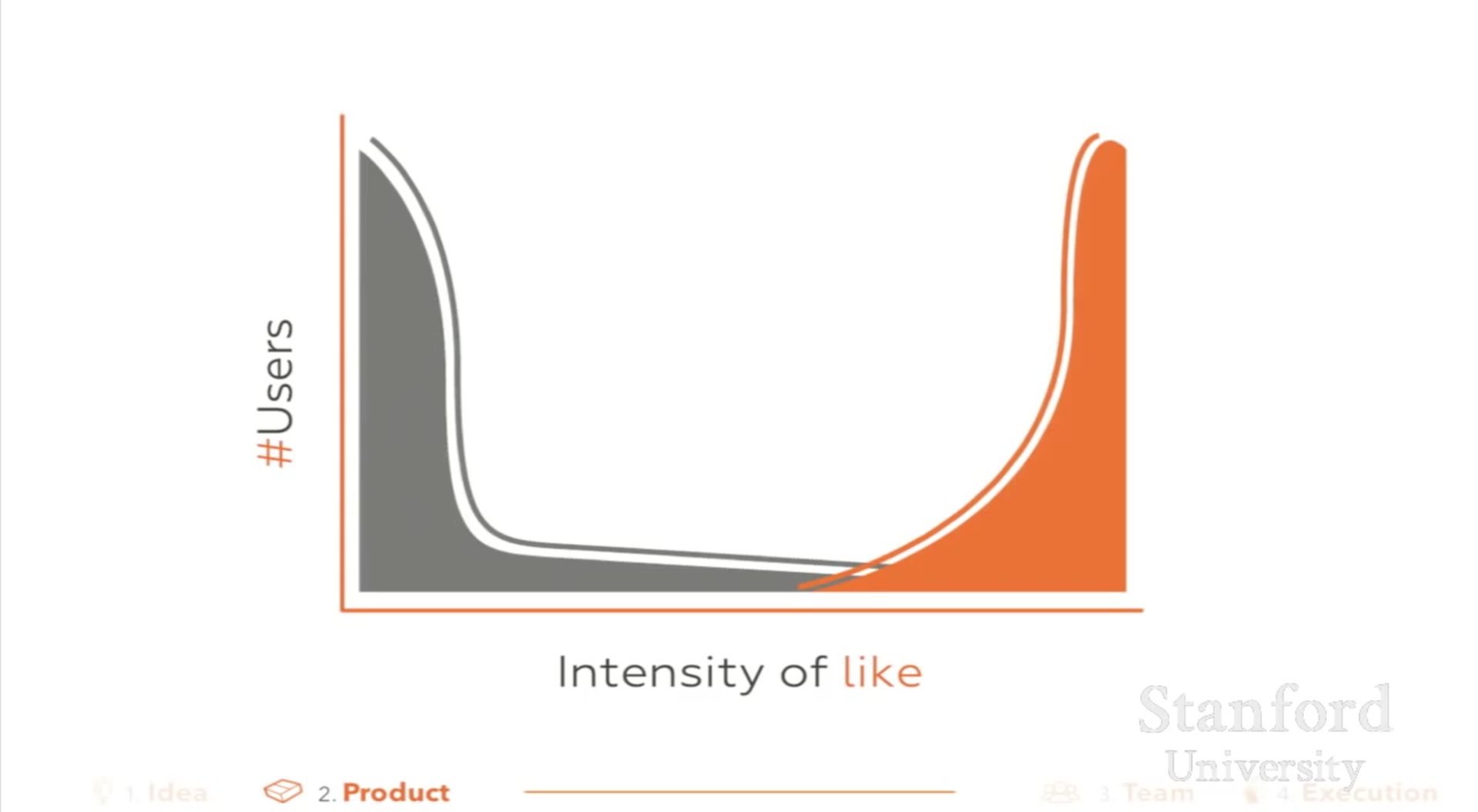
[ ]: ?
: , , . , Google Facebook. , , , . , , , - . , [ ]. , .
. [. ], . , . . , .

, « ». - , . B2C, B2B. .
, - «» - – , . – , .
– . . « », . , [. growth machine], , . , .
. , , . . . , – , . , .

, - . , . - , , , . – , .
, . , , – . Facebook . Google - – , . iPhone , , , .

« , », , – , , .
, «» [ «»]. , , . , YC – Pagerduty , , . . [] , – . – , , . , , .
, – , . Google, . , , . , Google Adwords, – , , .
, Pinterest – , Pinterest, . – - : « ?». Apple - Pinterest . , , , – -, , , . , , . , .
, , – . , . , , . , , , , . , , , , . .
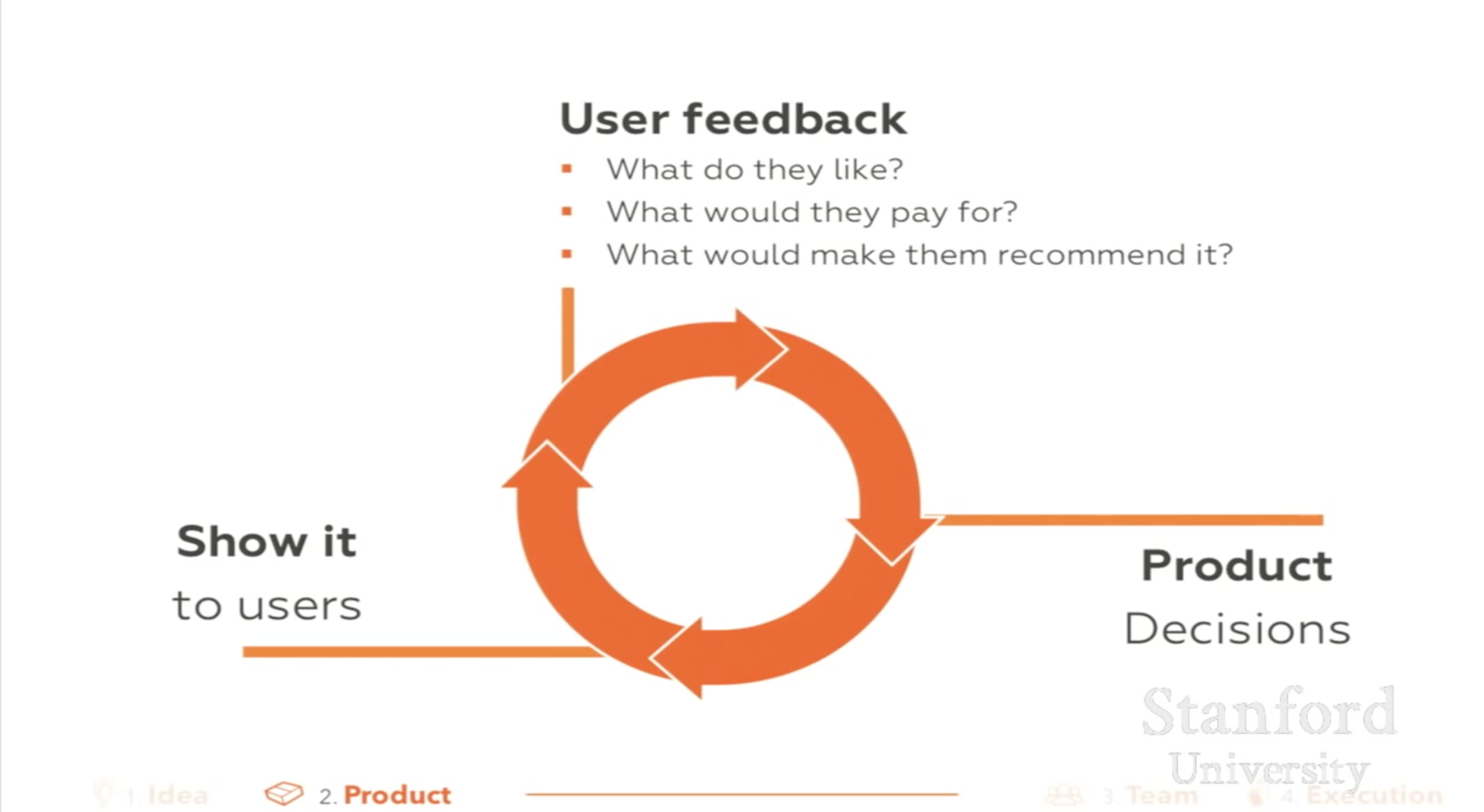
, . . , , , . , . , , . , , , -.
. 10% , . , . , , . , .
, . , , . , , .
. . , . , , , , , , , , , , .
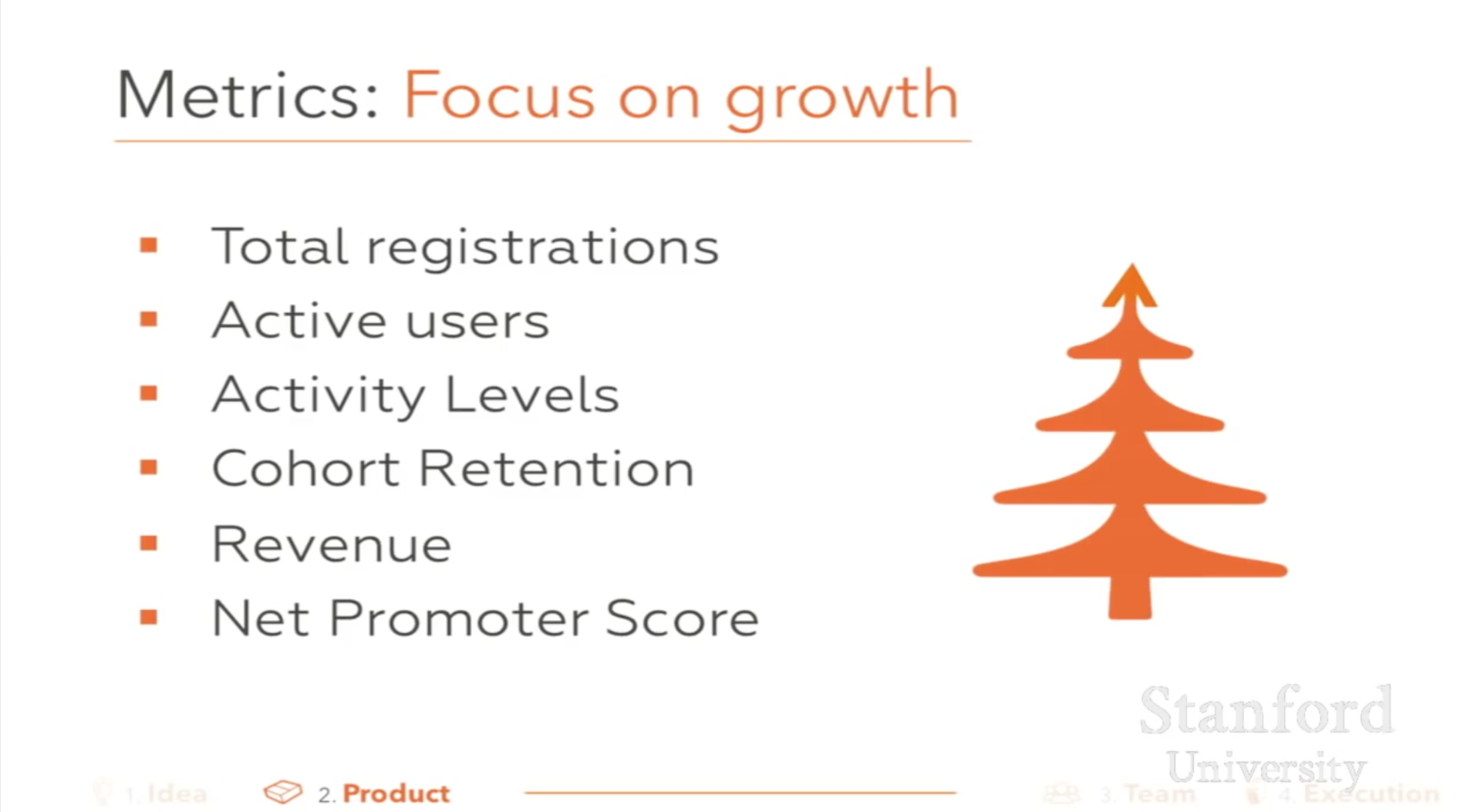
, . , CEO . -, , – , , , , , – . , , . , .
, , , . , , , , , . , , . , , – .
, , , . , , !
: ?

So Sam asked me to tell you why you need to create a startup. There are many well-known reasons why someone should try to organize their business - I hear them all the time. It is important to understand that the reasons lie in you - some of them only make sense in a specific context, and some of them may mislead you in general. You may be disoriented by the manner in which Hollywood or the press like to romanticize entrepreneurship, so I want to highlight some of these potential misconceptions, so that you make a fresh-minded decision. And then I will talk about the reason for creating startups that I like the most, it is strongly related to what Sam was just talking about. But, surprisingly, this reason is not the most popular. Usually people are guided by one of a number of other reasons or, as they say, open a company for the company.
So, I will list four main reasons for creating a startup: 1) “first, it’s beautiful”, 2) you are your own master, 3) your work becomes more flexible - first of all by increasing the flexibility of your schedule, 4) you you will be able to influence others more and make more money than if you were employed in an already formed company.
I think that you are quite familiar with this concept - when about a year ago I wrote a post on Medium that many of you read, it seemed to me that the stories [about entrepreneurs] in the media do not fully reflect the reality that entrepreneurship is slightly embellished. In the film, the Social Network showed a lot of negative aspects of what it means to be an entrepreneur, but on the whole the film drew us a picture: you hang out at parties and flit from one outstanding idea to another - such a description created the impression that doing business and really very cool.
I believe that reality is far from being so attractive, entrepreneurship has a dark side and, more importantly, in reality, you will spend most of your time on hard and ungrateful work. Sam mentioned this - it means that you will sit at the table, completely immersed in work, and respond to customer letters, make sales, solve complex technical issues. Therefore, it is very important to soberly assess the situation before starting your own business. And entrepreneurship is a rather nervous process. Not so long ago, an interesting publication appeared in the press: last week, The Economist magazine published a material entitled “Anonymous Entrepreneurs” in which the founder of the startup drew under the table and told about his entrepreneurial depression [it’s not entirely fair to say that the article is completely devoted to entrepreneurial depression , but the emotional side of the failure of a startup is quite detailed in it]. And it is - quite real. So let's be honest: if you are going to start a company, know that this will be incredibly difficult.

Why is entrepreneurship stressful? There are a couple of reasons for this. The first is that you have a lot of responsibility. People in any profession have the fear of failure, this is a kind of dominant motive of one of the trends in psychology. But if you are an entrepreneur, your fear of failure rests entirely on your shoulders and on the shoulders of all who choose to follow you. This is really a lot of pressure. In some cases, your failure can deprive people of their livelihood, and even if it is not, they decide to spend the best years of their lives following you. So you become responsible for their lost profits from not investing their time and energy in other projects. If something happens - you will be responsible for it in any case - not all the time, of course, you will be pulled out of bed at 3 o'clock in the morning, although for some startups this is possible - but if something important happens, to deal with this will have you. It will always be like this - it doesn’t matter whether on vacation or on a holiday - you must constantly monitor the situation and be morally ready to resolve all issues that arise. A good example of such stress is the process of attracting investment.
Here is a scene from Social Network. Here we celebrate something and work in parallel - someone sprinkles champagne everywhere - a lot of time was spent on Social Network in creating such frames. Mark is not present in this scene: another aspect, which was constantly focused on in the film, is an attempt to expose it to a finished nerd.

But the real photo from Palo Alto - he spent a lot of time around this table, working hard. Mark, of course, sometimes behaved like a nerd, but he did not refuse to have fun and was not a sociopath a la "outcast in love." Therefore, here he simply indicates his intention to focus on work, and [temporarily] not to communicate.

But the scene in which the occurrence of insight is shown, it seems to be taken from the Mind Games movie, they literally copied it from there. The creators of the Social Network preferred to depict this scene and jump from one to another with interruptions to parties.

But in reality, we all sat and worked all day. So if you take another photo for comparison, you will see: Mark is here in the same pose, but dressed differently - the photo was taken exactly the other day. That's what it looks like in reality - I just talked about it when I was talking about an article from The Economist.

Another kind of stress is unwanted press attention. If you are “in trend,” sometimes you get positive reviews in the media: it's nice to see yourself on the cover of Time and become the Man of the Year. It's not so nice to find one of your wedding photos in People magazine. It depends, of course, on you, I personally can’t tolerate it, but when Valleywag analyzes your lecture and puts you in tatters - you don’t really want it, nobody wants that at all.
I almost never heard people say that someone is much stronger than others. This is because if you work in a startup, and your nerves are at the limit, and things are not going the best way, you will feel unhappy, and you may end up with the project. If you are a founder, you also have the opportunity to act in a similar way, but others will not appreciate such an act - this episode will lay a black spot on your entire career. In fact, you will probably be loyal to the idea for ten years, if your business is going well, and about five years - if the circumstances are less fortunate. Out of these five three years, you will need to understand that your affairs are bad, and then, if you find where your company will be located, you will spend another two years in a company that will acquire your business. If you leave the project before this point, you will not only cause yourself financial damage, but also harm your employees. So, if your idea is not viable, and you realize it quickly, consider yourself lucky - most often everything happens differently in life.
I have to say that in my life there were a lot of stressful situations, especially in the first years of Facebook - I lost my health, didn’t take care of myself, often felt discomfort in my back - consistently every 6 months. And this despite the fact that I was 21-22 years old - this is real insanity! So, if you create a company, keep in mind that you will have to face this as well. And you have to really work with your health, this is one of your key responsibilities. Ben Horowitz likes to say that the number one CEO task is to manage his own psyche, and this is true, so make sure you work on it [Ben wrote a post about this with a saying title: “What is the most difficult CEO skill? "].
Ben Horowitz comments:
By the way, the most difficult skill that I, as a CEO, needed to acquire was the ability to manage my own psyche ... However, people hardly speak about him, and I have not read a single material on this topic. It is like a fighting club for managers: the first rule of the psychological crisis of the CEO is not to mention the psychological crisis.
Another reason [to set up a startup], especially if you are already working for another company, stems from your thoughts that “the people who run this other company are idiots, they make stupid decisions and they don’t waste time on what, and now if I create own company, then everything will be much better for me. I will set my own rules. ”
It sounds good - it makes sense. If you read my post, you know what follows next, I'll give you a couple of seconds to read this quote:
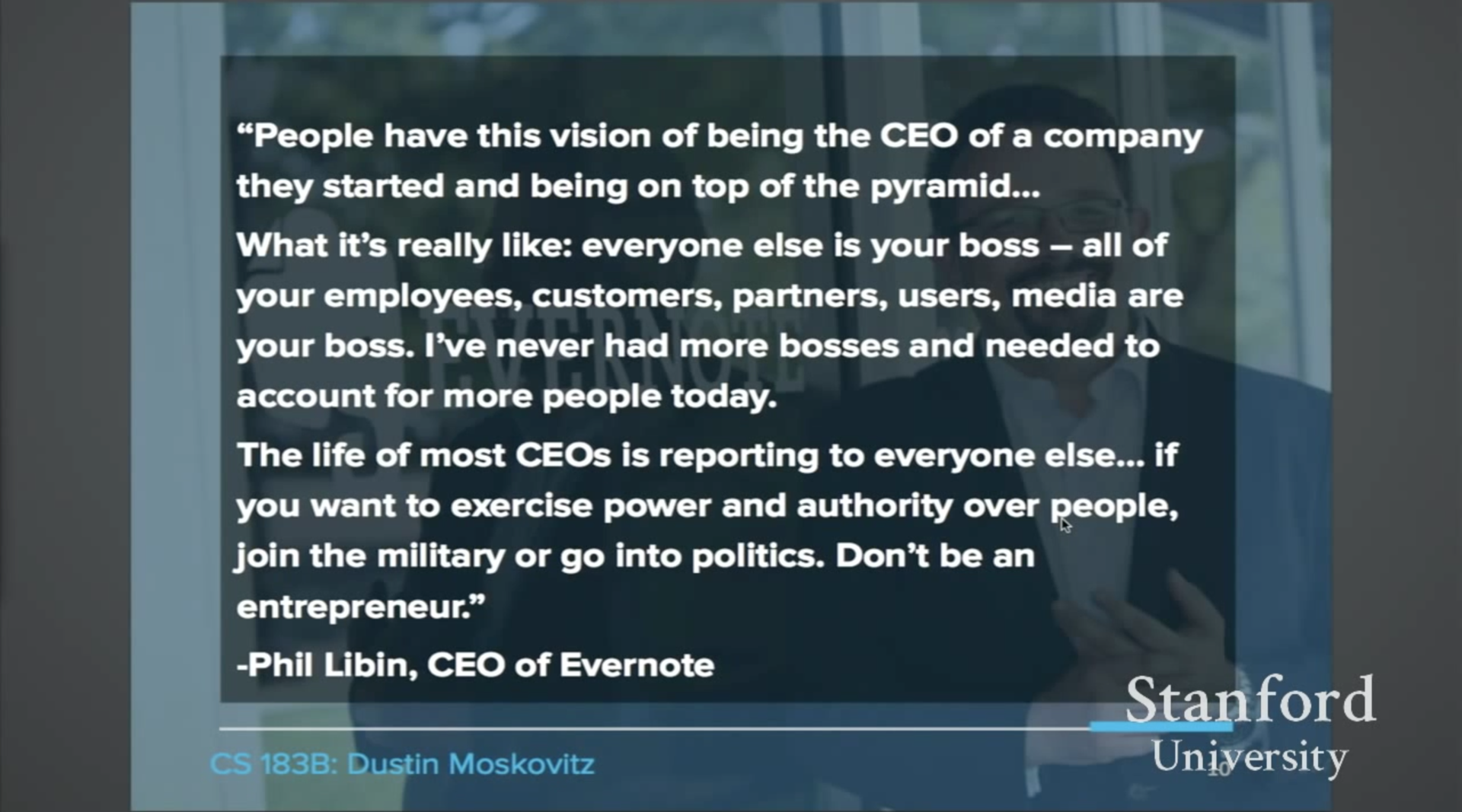
It seems to people that if they are the founders and CEO of a company, then they are at the top of the pyramid. It motivates someone, but the reality is not at all like it.
What reality is like: in reality, your superiors become everything — all your employees, customers, partners, users, the media — all of them are your superiors. I have never had more bosses, and I have never been forced to take into account the opinions of so many people.
Being a CEO means reporting to everyone around, at least that's what I think, and most of the CEOs I know. If you want to feel power over others, better go to the army or politics. Do not become an entrepreneur.
- Phil Libin
This quote finds a powerful response in me. It is important to emphasize that, in reality, decisions have many nuances. People whom you considered to be idiots, most likely, are not such - they just need to make very difficult decisions in conditions when each of their surroundings tries to pull them over to their side. So the most common task that I, as a CEO, have to deal with is working with problems that other people come to me with, working with the priorities they create - and most often it happens in the form of conflict. People want to move in different directions, customers want different things. And I may have my own opinion on all this, but my task in this case is to understand who I will disappoint the least of all, and try to maneuver between all these difficult situations.
This happens every day: I can come to work on Monday with ambitious plans about what I will do to make the company better. But if an important employee starts threatening us with dismissal, this will be my first priority. This is what I spend my time on.
The idea arising from the position that you yourself are your master is that you yourself control your schedule. This is a very attractive idea. And here is what reality looks like:
If you are going to become an entrepreneur, you, frankly, really get some flexibility in scheduling. You can work for any 24 hours a day!
- Phil Libin
This quote is also very close to me. The reason for this situation, in part, is that you should always "keep your finger on the pulse." Perhaps you are still not going to work around the clock, but you cannot control how you work and when you need to rest.
You are the role model of the company, and this is extremely important. You may have successful and unsuccessful weeks, in some periods you will feel weak and want to take a couple of days off. And, if you are an entrepreneur, doing so is bad. The team will replicate your behavior - so if you release your foot from the accelerator, they will do the same.
In any case, you will work permanently. If you really "burn" the idea, it will pull you along. If you work with first-class investors, with excellent partners, they will work tirelessly and will want the same from you.
Some companies like to tell stories that you can work as you please: you can arrange a four-day working week for yourself, and if you are Tim Ferris, then it's twelve o'clock. This idea is extremely attractive, and in certain cases it really works - for example, if you are engaged in a small business in a single market niche, or maybe several niches at once. But in this case, it should be determined already on the 2-3 client - in the end, you still have to go to full time.
You will have more money, and you can have a stronger influence on others.
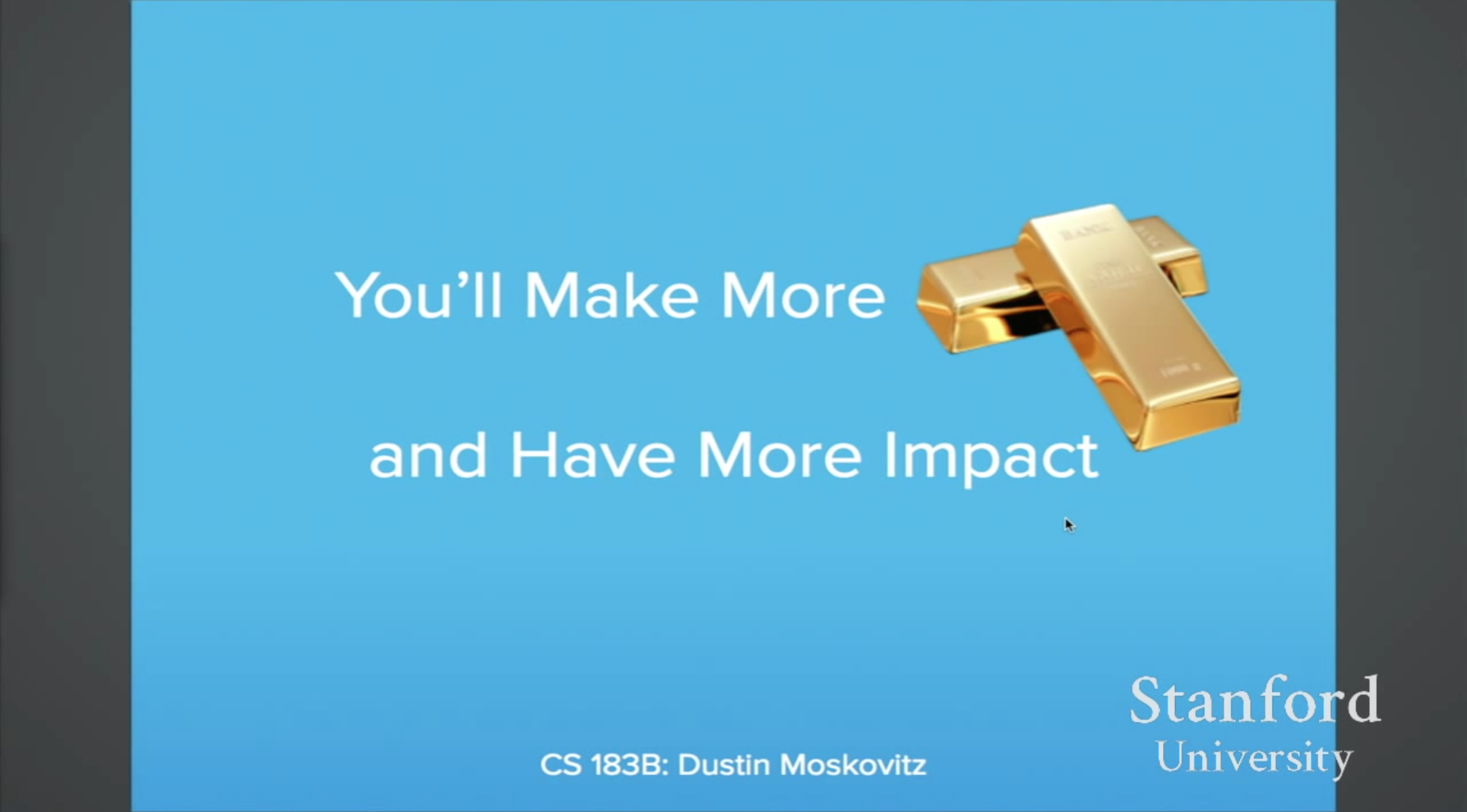
This is a powerful motivation, one that I hear most often - for example, when they say to me: “You know, I would like to work for a small company or create my own business, because in this way I will get a bigger piece of cake, I will have more influence on what the company does, I will have more shares, which means that I can raise more money. ” Let's find out when this may be true.
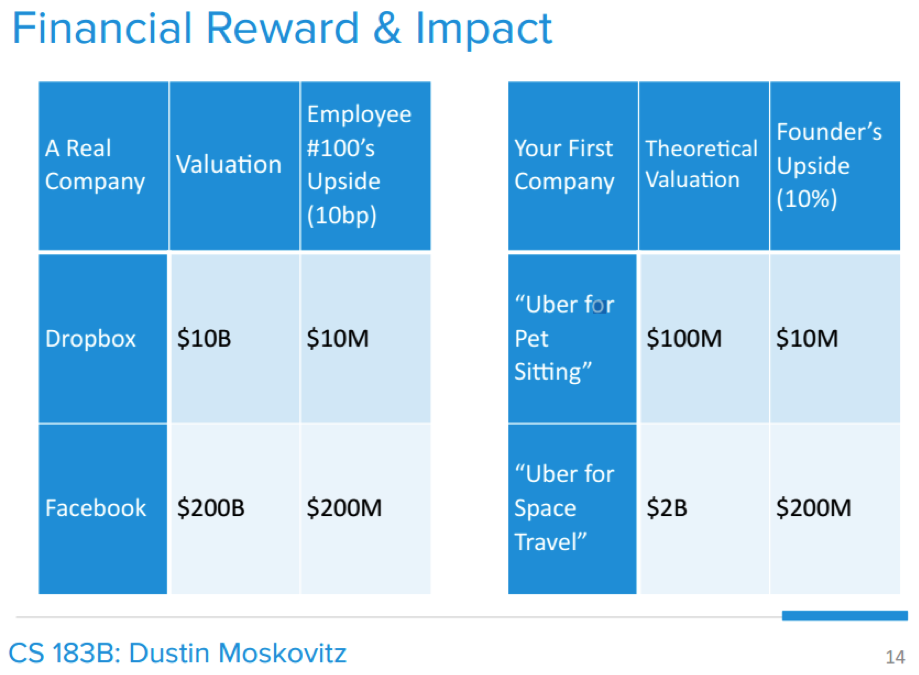
I will explain these tables. They are a bit confusing, so let's first focus on the table on the left. It deals with Dropbox and Facebook and their current estimated cost, as well as how much you could earn if you came to these companies as a hundredth employee - especially if you are an experienced engineer and you have about 5 years of work in the industry (in this case, you would most likely get a proposal in the region of 10 basis points [base point is one hundredth of a percentage point, so in the example the developer’s share in the company will be 0.1%]). If you had joined Dropbox a couple of years ago, the ceiling for increasing the return on stock prices for you would be about $ 10 million - and could increase further. If you joined Facebook in the second year of its existence, the ceiling on your stock returns would be $ 200 million - a huge amount! And even if you joined Facebook, as a thousandth employee (that is, you would do it in 2009), you could still make $ 20 million, and this is also a huge amount - these are the indicators you should focus on when thinking about how much can you earn as an entrepreneur.
We now turn to the table on the right - here are two fictional companies, the founder of which you can become. “Uber for pet care [in the absence of owners — for example, during holidays]” is a great idea [Fred Wilson of Union Square Ventures called companies like “Uber pet care” for companies like “This for that” and wrote about this post ], and if it suits you, then you will be able to start and create a great company valued at $ 100 million, and your share in the company will probably be about 10% - this figure may fluctuate, some founders have a higher share, some - lower, but after repeated azmyvaniya your interest in the company and a number of rounds to create a pool of options you have in all probability, will own approximately the part of the company. If for you this value turns out to be more, pay attention to Sam's post about division of shares in the company between the founders and employees - most likely you should share a part of your share.
So, if you are extremely confident that you can create a company for $ 100 million, which in itself is a big question (naturally, you have more confidence in Facebook in 2009 or Dropbox in 2014 than in a startup that is not yet there is), then it is worth doing. The indicators in the left and right tables are comparable only if you have an idea of no less than $ 100 million, and you are absolutely sure that you can implement it.
If you consider yourself a person who can create a “Uber for space travel” (and this is a very serious undertaking, a $ 2 billion undertaking), you will receive a decent amount from it. Definitely, it is worth doing this - the company will be assessed in such a price in just 4 years, so this idea makes sense, and if you are thinking of implementing something like this, then you can not listen to me, but go and create a company right away.
So how are financial reward and influence related? I am sure that financial reward strongly correlates with the influence that we have on the world around us: if you do not believe me, let's look at a number of specific examples and [for the time] forget about shares in the company.
So why can you have a serious impact on the world around you by joining an already formed company? Because in this way you get the multiplier of your efforts: in such a company there are already a certain number of users - if it is Facebook, then we are talking about a billion users - the same can be said about Google. In such a company, an infrastructure already exists on the basis of which you can create your product - this is true for new startups, such as AWS and all sorts of cool independent service providers, but, as a rule, you get some kind of microtechnology that is company’s , and the company develops it for you, therefore such a company is an excellent platform for starting. And besides, you work in a team that helps you develop your ideas and turn them into something significant.
: Google Google Maps, , , , – , – . , , , .
Google – , , Gmail – , , , Ajax . , . , , , .
, , , , Facebook, , , «Like», -, , . , – , , , , , , Facebook.
: .
, - ?
- – , , - [ ] . , , , . , ?

, , « » . , , , . , , , . « », – « », , , , - . . , , , .
– , -. , , – . , , . , , , , - , , .
« , -» «». , , . , , - . , – , – .
, Asana: « » – Facebook . , , , , , , , , .
- , , . , Facebook, , . , , , , , , , . , , , , , , . – , . , , – , – .
. :

[ ]
Source: https://habr.com/ru/post/241885/
All Articles